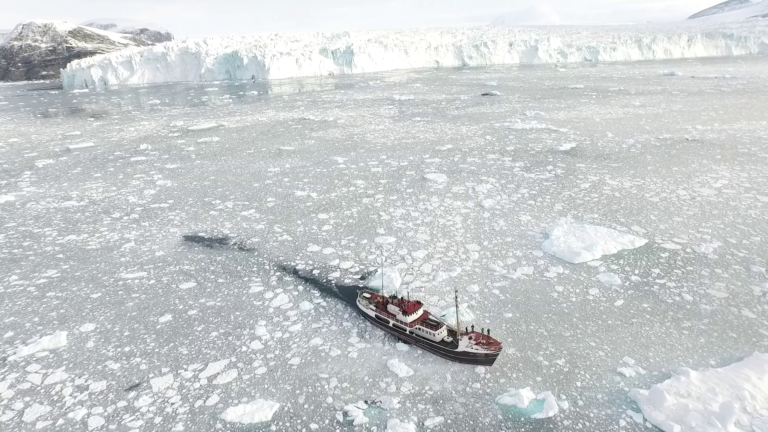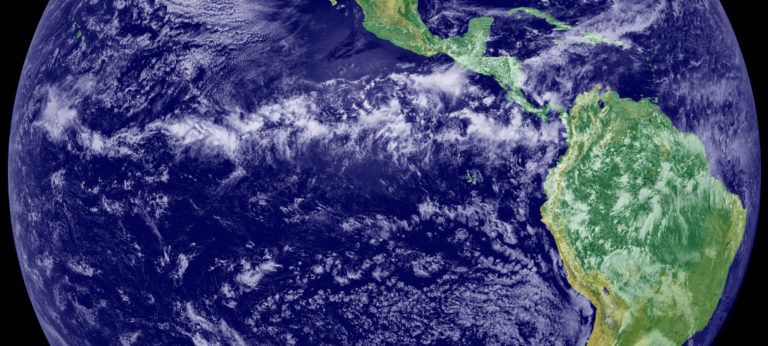Tag: climate change
While conducting a study of Petermann Glacier in northwest Greenland, researchers at the University of California, Irvine and NASA’s Jet Propulsion Laboratory uncovered a previously unseen way in which the ice and ocean interact. The glaciologists said their findings could mean that the climate community has been vastly underestimating the magnitude of future sea level rise caused by polar ice deterioration.
Using satellite radar data from three European missions, the UCI/NASA team learned...
Earth system scientists uncover ice-age shift in Pacific Ocean circulation
The overturning circulation of the Pacific Ocean “flipped” during the last ice age, altering the placement of ancient waters rich in carbon dioxide, according to Earth system scientists at the University of California, Irvine.
In a paper published in Science Advances, the researchers suggest that this shift in the 3D churning of such a large ocean basin must have enhanced the sequestration of CO2 in the deep sea, thereby lowering the amount of the greenhouse gas in ice-age Earth’s...
Up-trending farming and landscape disruptions threaten Paris climate agreement goals
UCI-led team tracked global land-use greenhouse gas emissions from 1961 to 2017
January 27, 2021 — One of President Joe Biden’s first post-inauguration acts was to realign the United States with the Paris climate accord, but a new study led by researchers at the University of California, Irvine demonstrates that rising emissions from human land-use will jeopardize the agreement’s goals without substantial changes in agricultural practices.
In a paper published today in Nature, the...
Increasing ocean temperature threatens Greenland’s ice sheet
UCI and NASA JPL scientists study impact of warm, salty water beneath glaciers
January 25, 2021 — Scientists at the University of California, Irvine and NASA’s Jet Propulsion Laboratory have for the first time quantified how warming coastal waters are impacting individual glaciers in Greenland’s fjords. Their work is the subject of a study published recently in Science Advances.
Working under the auspices of the Oceans Melting Greenland mission for the past five years, the researchers...
UCI researchers: Climate change will alter the position of the Earth’s tropical rain belt
Difference by the year 2100 expected to impact global biodiversity, food security
January 18, 2020 – Future climate change will cause a regionally uneven shifting of the tropical rain belt – a narrow band of heavy precipitation near the equator – according to researchers at the University of California, Irvine and other institutions. This development may threaten food security for billions of people.
In a study published today in Nature Climate Change, the interdisciplinary team...
UCI-led project seeks to combat wildfires
A University of California, Irvine-led team has received $3.6 million over three years for a project that uses science and engineering to help California fight wildfires. The funding comes from the University of California Laboratory Fees Research Program competition, a contest designed to promote the development of multicampus projects and collaborations that advance the missions of the national laboratories and University of California.
As wildfires in California grow more frequent and severe,...
UCI-led Project Seeks to Combat Wildfires
Jan. 15, 2020 – A UC Irvine-led team has received $3.6 million over three years for a project that uses science and engineering to help California fight wildfires. The funding comes from the University of California Laboratory Fees Research Program competition, a contest designed to promote the development of multicampus projects and collaborations that advance the missions of the national laboratories and University of California.
As wildfires in California grow...
Greenland ice loss is at ‘worse-case scenario’ levels, study finds
UCI glaciologists play key roles on international assessment team
Irvine, Calif., Dec. 19, 2019 – Greenland is losing ice mass seven times faster than in the 1990s, a pace that matches the Intergovernmental Panel on Climate Change’s high-end warming scenario – in which 400 million people would be exposed to coastal flooding by 2100, 40 million more than in the mid-range prediction.
The alarming update resulted from the Ice Sheet Mass Balance Intercomparison Exercise, a project involving...
UCI-led team releases high-precision map of Antarctic ice sheet bed topography
New findings will help scientists predict climate change impact on frozen continent
Irvine, Calif., Dec. 12, 2019 – A University of California, Irvine-led team of glaciologists has unveiled the most accurate portrait yet of the contours of the land beneath Antarctica’s ice sheet – and, by doing so, has helped identify which regions of the continent are going to be more, or less, vulnerable to future climate warming.
Highly anticipated by the global cryosphere and environmental science communities,...
Plant physiology will be major contributor to future river flooding, UCI study finds
By hoarding water underground, vegetation will help saturate soil, boosting rain runoff
Irvine, Calif., Oct. 21, 2019 – The next time a river overflows its banks, don’t just blame the rain clouds. Earth system scientists from the University of California, Irvine have identified another culprit: leafy plants.
In a study published today in Nature Climate Change, the UCI researchers describe the emerging role of ecophysiology in riparian flooding. As an adaptation to an overabundance of carbon...





